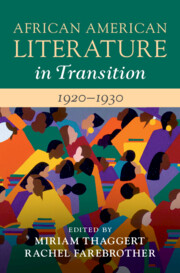Book contents
- African American Literature in Transition, 1920–1930
- African American Literature in Transition
- African American Literature in Transition, 1920–1930
- Copyright page
- Contents
- Illustrations
- Contributors
- Acknowledgments
- Chronology of Historical Events, People, and Publications, 1920–1930
- Preface
- Introduction
- Part I Habitus, Sound, Fashion
- Part II Space
- Part III Uplift Renewed
- Part IV Serial Reading
- Chapter 11 The Midnight Motion Picture Company Goes to Europe
- Chapter 12 African American Magazine Modernism
- Bibliography
- Index
Chapter 11 - The Midnight Motion Picture Company Goes to Europe
The Harlem Renaissance and Global White Supremacy
from Part IV - Serial Reading
Published online by Cambridge University Press: 17 March 2022
- African American Literature in Transition, 1920–1930
- African American Literature in Transition
- African American Literature in Transition, 1920–1930
- Copyright page
- Contents
- Illustrations
- Contributors
- Acknowledgments
- Chronology of Historical Events, People, and Publications, 1920–1930
- Preface
- Introduction
- Part I Habitus, Sound, Fashion
- Part II Space
- Part III Uplift Renewed
- Part IV Serial Reading
- Chapter 11 The Midnight Motion Picture Company Goes to Europe
- Chapter 12 African American Magazine Modernism
- Bibliography
- Index
Summary
Adam McKible makes a strong case for attending to popular white writers of the 1920s who used fiction to give ballast to Jim Crow. Analysis of Octavus Roy Cohen’s work in the Saturday Evening Post demonstrates how Harlem Renaissance writers were positioning their work against white popular fiction that threatened to obscure the realities of African American lives and history behind a continuous stream of invective, disdain, and ridicule. Cohen created a new mode of popular fiction that combined sustained engagement with modernity and technology with familiar tropes from minstrelsy. The chapter reads Cohen’s representation of globetrotting black characters in dialogue with Harlem Renaissance writers’ deployment of the motif of shadows to explore both the realities and representational strategies of segregation and the shadow of imperialism. In doing so, it complicates a tendency to equate transnationalism and diasporic identities with radicalism, noting that Cohen repurposed representations of Black modernity and travel for white supremacist ends.
Keywords
- Type
- Chapter
- Information
- African American Literature in Transition, 1920–1930 , pp. 287 - 309Publisher: Cambridge University PressPrint publication year: 2022

